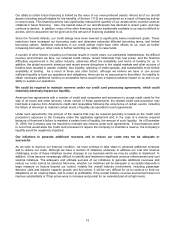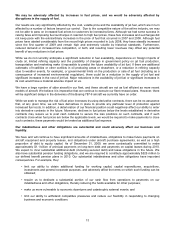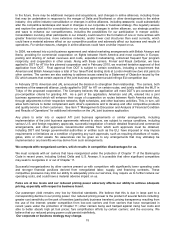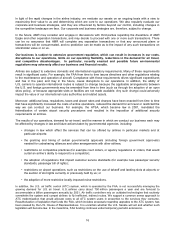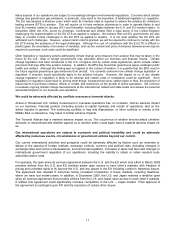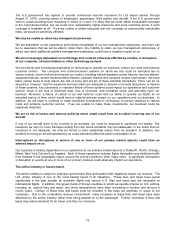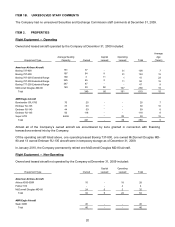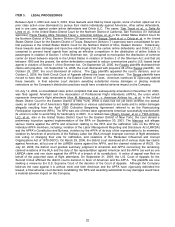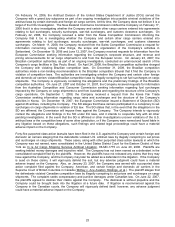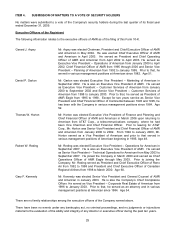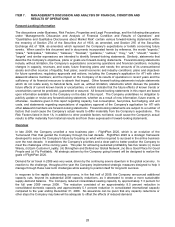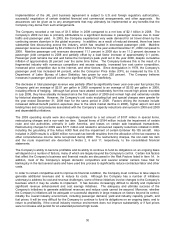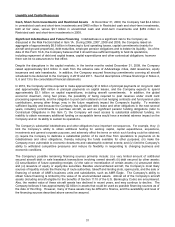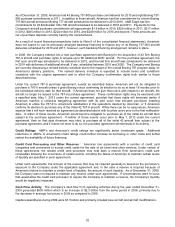American Airlines 2009 Annual Report Download - page 25
Download and view the complete annual report
Please find page 25 of the 2009 American Airlines annual report below. You can navigate through the pages in the report by either clicking on the pages listed below, or by using the keyword search tool below to find specific information within the annual report.
22
ITEM 3. LEGAL PROCEEDINGS
Between April 3, 2003 and June 5, 2003, three lawsuits were filed by travel agents, some of whom opted out of a
prior class action (now dismissed) to pursue their claims individually against American, other airline defendants,
and in one case, against certain airline defendants and Orbitz LLC. The cases, Tam Travel et. al., v. Delta Air
Lines et. al., in the United States District Court for the Northern District of California, San Francisco (51 individual
agencies), Paula Fausky d/b/a Timeless Travel v. American Airlines, et. al, in the United States District Court for
the Northern District of Ohio, Eastern Division (29 agencies) and Swope Travel et al. v. Orbitz et. al. in the United
States District Court for the Eastern District of Texas, Beaumont Division (71 agencies) were consolidated for pre-
trial purposes in the United States District Court for the Northern District of Ohio, Eastern Division. Collectively,
these lawsuits seek damages and injunctive relief alleging that the certain airline defendants and Orbitz LLC: (i)
conspired to prevent travel agents from acting as effective competitors in the distribution of airline tickets to
passengers in violation of Section 1 of the Sherman Act; (ii) conspired to monopolize the distribution of common
carrier air travel between airports in the United States in violation of Section 2 of the Sherman Act; and that (iii)
between 1995 and the present, the airline defendants conspired to reduce commissions paid to U.S.-based travel
agents in violation of Section 1 of the Sherman Act. On September 23, 2005, the Fausky plaintiffs dismissed their
claims with prejudice. On September 14, 2006, the court dismissed with prejudice 28 of the Swope plaintiffs. On
October 29, 2007, the court dismissed all actions. The Tam plaintiffs appealed the court’s decision, and on
October 2, 2009, the Sixth Circuit Court of Appeals affirmed the lower court decision. The Swope plaintiffs have
moved to have their case remanded to the Eastern District of Texas. American continues to vigorously defend
these lawsuits. A final adverse court decision awarding substantial money damages or placing material
restrictions on the Company’s distribution practices would have a material adverse impact on the Company.
On July 12, 2004, a consolidated class action complaint that was subsequently amended on November 30, 2004,
was filed against American and the Association of Professional Flight Attendants (APFA), the union which
represents American’s flight attendants (Ann M. Marcoux, et al., v. American Airlines Inc., et al. in the United
States District Court for the Eastern District of New York). While a class has not yet been certified, the lawsuit
seeks on behalf of all of American’s flight attendants or various subclasses to set aside and to obtain damages
allegedly resulting from the April 2003 Collective Bargaining Agreement referred to as the Restructuring
Participation Agreement (RPA). The RPA was one of three labor agreements American successfully reached with
its unions in order to avoid filing for bankruptcy in 2003. In a related case (Sherry Cooper, et al. v. TWA Airlines,
LLC, et al., also in the United States District Court for the Eastern District of New York), the court denied a
preliminary injunction against implementation of the RPA on September 30, 2003. The Marcoux suit alleges
various claims against the APFA and American relating to the RPA and the ratification vote on the RPA by
individual APFA members, including: violation of the Labor Management Reporting and Disclosure Act (LMRDA)
and the APFA’s Constitution and By-laws, violation by the APFA of its duty of fair representation to its members,
violation by American of provisions of the Railway Labor Act (RLA) through improper coercion of flight attendants
into voting or changing their vote for ratification, and violations of the Racketeer Influenced and Corrupt
Organizations Act of 1970 (RICO). On March 28, 2006, the district court dismissed all of various state law claims
against American, all but one of the LMRDA claims against the APFA, and the claimed violations of RICO. On
July 22, 2008, the district court granted summary judgment to American and APFA concerning the remaining
claimed violations of the RLA and the duty of fair representation against American and the APFA (as well as one
LMRDA claim and one claim against the APFA of a breach of its constitution). A notice of appeal was filed on
behalf of the purported class of flight attendants. On September 21, 2009, the U.S. Court of Appeals for the
Second Circuit affirmed the district court’s decision in favor of American and the APFA. The plaintiffs are now
seeking a review by the U.S. Supreme Court of the decision of the Court of Appeals. Although the Company
believes the case against it is without merit and both American and the APFA have vigorously defended the
lawsuit, a final adverse court decision invalidating the RPA and awarding substantial money damages would have
a material adverse impact on the Company.


